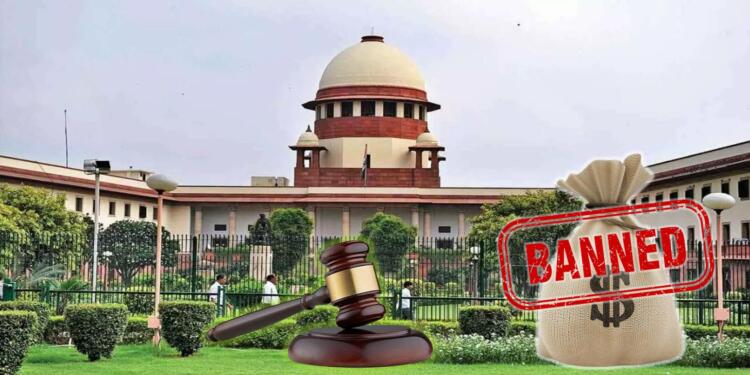- Supreme Court has upheld the changes brought in by Modi government to improve the functioning of FCRA
- The court opined that excessive foreign funding could damage the socio-economic fabric of the Country
- Supreme Court observation has vindicated Modi government’s apprehensions toward these NGOs
Ever since the Modi government came to the helm of affairs, its topmost priority has been removing the influence of foreign funding in India. The government even amended the law to usher in reforms in FCRA. Now, Supreme Court has stamped its authority on those changes.
Foreign funding can affect India’s interest
A three bench of Justices A M Khanwilkar, Dinesh Maheswari and CT Ravikumar have affirmed that the amendment to FCRA was done for the national interest. The observation came after three separate petitions requesting changes in FCRA were filed in SC. Two of them challenged the Constitutional validity of the amendments while one of them asked for stricter implementation.
Hon’ble Court opined that foreign contribution can easily change the dynamics of Indian polity. It added that they can also influence the policies and impose a certain ideological tilt. Stating that foreign funds can anytime destabilize the social order, Court said, “Such being the expanse of the effect of foreign contribution coupled with the tenet of constitutional morality of the nation, the presence/inflow of foreign contribution in the country ought to be at the minimum level, if not completely eschewed. The influence may manifest in different ways, including in destabilizing the social order within the country,”
Medicines need to be consumed moderately
While deciphering the reasons for newly introduced stringent provisions, the Bench tracked the legislative history of FCRA. The Bench was in agreement with the need for chops and changes for minimizing the negative impact of foreign funding in the Country. Justice Khanwilkar, one of the judges of the Bench said that foreign donation is like gratifying intoxicant replete with medicinal properties and may work like nectar.
Warning that insisting on using it may lead to change in the sovereign structure of the country, Justice Khanwilkar said, “However, it serves as a medicine so long as it is consumed (utilized) moderately and discreetly…free and uncontrolled flow of foreign contribution has the potential of impacting the sovereignty and integrity of the nation.”
Amendments and petitioners’ objections
The amendments prohibit foreign funds’ beneficiaries from transferring funds to any other entity. Moreover, the government had also prohibited using more than 20 per cent of funds for administrative purposes. By claiming that the money is being used for administrative purposes, NGOs used to siphon off funds for nefarious activities.
The amendments under Section 11(2) allow the existing Central governments to direct an entity to not utilize foreign funds if it is being investigated for violations. Moreover, the Modi government made it mandatory for receivers of foreign funds to deposit the amount in the New Delhi Branch of State Bank of India. Also, the key members of NGOs receiving foreign funding are now required to submit their Aadhar number to the government.
Read more: Election Commission’s plan to link Voter IDs with Aadhar will put many politicians out of business
The petitioners claimed that the changes made it difficult to run NGOs in India, while the Center asserted that it was designed to prevent malpractices and diversion of funds by NGOs.
NGOs do more harm than good
It is now a fact in India that NGOs do more harm to the country than good. In the name of working for the poor, these organizations get millions of dollars from foreign countries and use it to destabilize the socio-cultural dynamics of the country. The money is mainly used to fund frivolous protests against development projects.
A lot of times, they have been successful in either stopping completely or putting a temporary halt on massive projects of national importance. Medha Patkar’s marathon attempt to stop Sardar Sarovar Dam is well documented. Similarly, these NGOs were successful in stopping India from producing 40 per cent of its copper.
Similarly, the conversion brigade of religious groups masquerading as non-political NGOs from around the world has resorted to such nefarious tactics as paying people to protest against the setting up of projects and corporations, such as the Kudankulam nuclear plant agitation or the POSCO agitation in Odisha.
Read more: Home Ministry puts development-hating green energy eco fascists under FCRA watchlist
NGOs also spread extremism
Then there is the religious extremist NGOs that only work to strengthen fundamentalism and radicalism in the country. However, the government has now started coming after them as well. In August last year, the FCRA license of Markazul Ighasathil Khairiyathil Hindiyya, a Kerala-based NGO linked to prominent Sunni leader Sheikh Aboobacker Ahmed was revoked over “misutilization” of funds, misrepresentation of facts and non-filing of annual FCRA returns in 2019-20.
After the Britishers left the country, foreign-funded NGOs took their place to supposedly act towards the upliftment of the poor. In the garb of the poor, they work towards securing foreign establishments’ influence in India. They need to be weeded out. Supreme Court’s observations should make it easier for law enforcement agencies to throw them out.
























